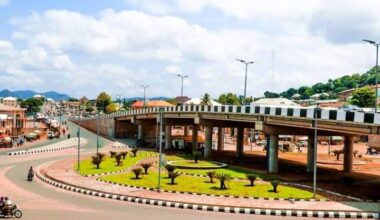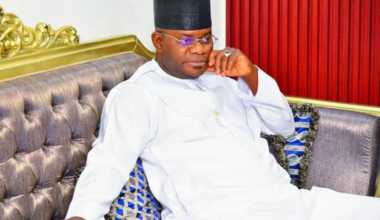By Adebayo Abubakar
Minimum wage is a wage below which an employer of labour in a country or an area of jurisdiction must not pay as salary, both in the public and private sectors, usually defined by law. History is replete with the struggle for pay raises by organised labour, with what they always want being “More. More money. More bonus. More allowance”.
The issue of how much to pay as minimum wage is not as key as the ability of the employer to pay. Therefore, the issue is always subjected to the process of collective bargaining between the organised labour union and the employers, their representatives or associations as the case may be. It is, therefore, unfathomable that the government will agree to, and sign off, a minimum wage and still refuse to pay under the excuse that it cannot afford to pay. The issue of minimum wage is a very volatile one in countries where there is a not-so-strong economic institution like Nigeria where our macroeconomy lacks the supportive institutions that could help achieve price stability over a relatively long period of time. Galloping inflation is usually the case where appropriate economic policy is never initiated to prevent or at least slowdown inflation which tends to erode the purchasing powers of salary earners – the workers as a result tend to ask for an upward review of their pay.
The aforementioned is why the controversy about the minimum wage is always at the core of industrial relations between the organised labour, the Nigeria Labour Congress (NLC), the Trade Union Congress (TUC), and the Joint National Public Service Negotiating Council, (JNPSNC -Trade Union side), and employers of labour (government and private companies) in Nigeria. It is always a nightmare for the government whenever these trade unions threaten to or embark on strike. The whole nation is usually locked down. Such was looming before President Muhammadu Buhari, in 2019, signed the current national minimum wage act into law which pegs it at ₦30,000. It suffices to say that respite came the way of civil servants, both at the state and federal levels, following the signing. Since the issue of minimum wage is enshrined in the exclusive list of the Nigerian constitution, the issue of states and local governments having to domesticate it first before implementation does not arise. That was, at least, the thought of many. It was therefore shocking to know that some state governors were shopping for excuses not to pay especially when one remembers that their representatives were at the negotiation table where the agreement was reached.
Meanwhile, as if that was not enough, findings show that the penultimate minimum wage of ₦18,000 was yet to be implemented by some states of the federation before the signing into law of this latest one (₦30,000). Prominent among the states that are culpable is Kogi. This culpability predated the assumption of office of Governor Yahaya Bello, under whose reign the cry of “mutilated salary” is allegedly much more pronounced than under any administration in the 31 years of existence of Kogi as a state.
Recently, a screenshot of some Kogi state civil servants’ salary bank notification went viral on social media, indicating that the owner of the account just earned, as a monthly salary for February 2022, an amount as low as ₦2,000. It was clearly labelled “Sal.”, (which means salary) for the month of February 2022. For heaven’s sake, how would a human being residing in Nigeria in this 21st century, survive on ₦2,000 in a month, let alone the ones with dependants and other responsibilities? I doubt the veracity of the claim that a presidential governor, like Yahaya Bello, could deem it appropriate to pay as low as 6.6% of the approved national minimum wage to its employees. It appears as if there is a maximum wage, within the minimum wage. It beats my imagination as there has been no form of official statement from the state government to either, confirm or deny the claim.
I have been meaning, therefore, to write about the issue (in Kogi state), for a very long time, but I had to get my facts right first; so, my finding from an insider (in the state’s ministry of finance) who could not say whether it is true or not, revealed that some people might have actually mortgaged their salaries for loans or salary advance in the past such that the liabilities of those loans have been collapsed into their salary account, which explains the bloody injury on the take-home pay that is sometimes as low as ₦2,000, for a grade level-13 or 14 officer in the state civil service.
Be that as it may, there is a rule guiding the repayment of loans by a salary earner; the maximum deduction from such a person’s salary is 45% of whatever he earns per month. Unless you’re telling me that the ₦2,000 on the screenshot circulating on social media is 55% of the owner’s monthly salary, which is way below the national minimum wage. That would, in any case, contravene the minimum wage law.
Whatever be the case, methinks it is high time our “presidential governor” (Alhaji Yahaya Adoza Bello) came clean and explained to the world what appears like a maximum-minimum wage and the yet-to-be-debunked story of “amputated salary” being paid civil servants in Kogi state. If not for anything, at least, for the sake of “our next project”- 2023 presidential ambition. I have resisted the urge to join the bandwagon of Thomases who do not believe that what happened in the November 2015 governorship election in Kogi state could happen in the next presidential election. No pun intended, and no disrespect meant for the sensibility of the family late Prince Abubakar Audu, I do not also intend to take credit off the sequence of events that culminated in Bello being found eligible to inherit APC’s votes in the “inconclusive” election, in which the presumed winner (Prince Abubakar Audu) died while the collation of results was still in progress. But it must be made known that in evaluating his presidential capacity, Nigerians would benchmark him with what he has done in the previous eight or seven years plus. And workers’ welfare will most definitely be among the most important parameters that will be considered.
It is either Bello, his commissioner for information and communication, Kingsley Fanwo, or any other appointee designated for the purpose comes out to explain, with verifiable evidence, the government’s position on this ugly and insidiously trending story about the misery his administration allegedly subjects civil servants in the state to.
It is instructive to note that when Governor Yahaya Bello came into office, he carried a responsibility of demonstrating to the whole world what Nigeria has been missing in terms of capacity to deliver, by not having the demographic he represents – the youths, of about 40 years of age, in government such that the vibrancy that accompanies their youthful age could be channelled into recalibrating the Nigerian socioeconomic structure so she would remain competitive among the comity of nations. It is therefore disheartening to find out that, in all the indices of governance as it affects the welfare of the people and even the civil servants around him, it has been tales of misery. Retirees fare no better. He was alleged to have arbitrarily stopped some people’s pension during his never-ending screening exercise that turned out to be the most remembered project (albeit for negative reasons) his administration ever embarked upon. Some who scaled the hurdle (of the screening) have their pensions amputated. A very close relative of mine was denied her pension in the governor’s first six years. When she was eventually cleared, with nobody talking about her arrears, they have been paying her 25% of her monthly entitlement which is no less irregular than the salaries of those who are still in active service. It was so horrible that some electoral abracadabra in the colour of “Taratatatataaaaataaaa”(whatever that means) political philosophy had to be deployed before his second term could be secured. No wonder.
I do not envy whoever is going to take over from Bello come January 2024 because there has been a lot of political baggage, (call it landmines, if you like) which handling requires some political sagacity. Otherwise, the successor might be the one to pay the political price. By and large, it is my candid opinion that the people of Kogi, especially the civil servants, deserve more and better than they are getting from the state government.
Abubakar writes from Ilorin. He can be reached via 08051388285 or marxbayour@gmail.com


